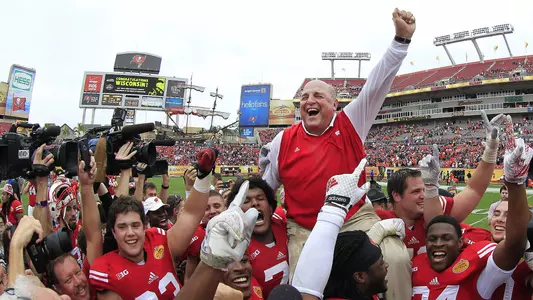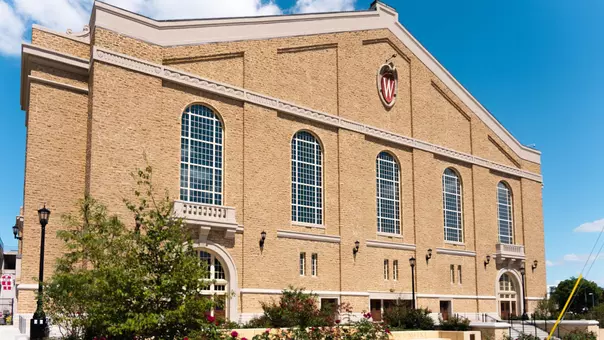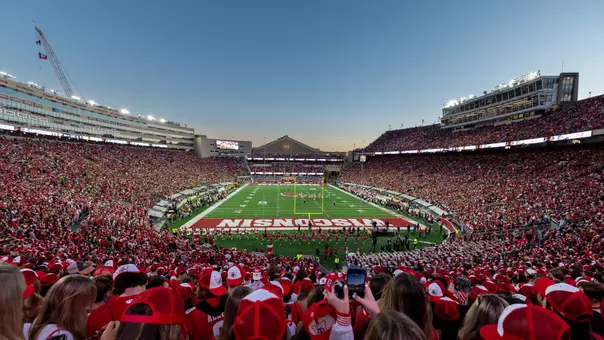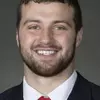
Keeping his word: Alvarez forever changed what it means to be a Badger
April 05, 2021 | Football, General News, Mike Lucas
On the eve of his retirement, Barry Alvarez reflects on three decades of excellence at Wisconsin
 |
|
|
BY MIKE LUCAS
UWBadgers.com Senior Writer
MADISON, Wis. — There has never been any hesitancy in Barry Alvarez identifying one of his driving forces for more than three decades as Wisconsin's football coach and director of athletics.
It goes all the way back to when Alvarez, an impressionable 17-year-old from western Pennsylvania, came under the influence of the legendary Bob Devaney at the University of Nebraska.
Devaney was a Hall of Fame coach who built the Cornhuskers into a national powerhouse after inheriting a hapless program that had losing records in 18 of the previous 21 years.
While winning 83 percent of his games and two national championships over his 11 seasons on the sidelines, the stadium was expanded from 34,000 to 72,000. Sell-outs became the norm. Devaney was also a successful athletic director from 1967 to 1993 (including time served in the dual role of coach-AD) and elevated the school's all-sports rankings in the Big Eight from last to first.
The Alvarez playbook with the Badgers rose out of the Devaney model with the Huskers. The Devaney run was 31 years (1962-1993) at Nebraska. Alvarez is in his 32nd year (1990-2021) at Wisconsin.
"I've always said that what I wanted to do here was what Bob Devaney did in Lincoln," Alvarez says now with fulfillment. "I wanted to build a winning football program — and sustain it — and then I wanted to take over as the athletic director and keep making the department and all sports better.
"I think I can say that I did that. Did I exceed my own expectations? No. I did just what I thought he (Devaney) did. When there were opportunities to leave — and they were always flattering — you go back to asking, 'What are your goals? I didn't want to be a vagabond coach bouncing around.
"I wanted to put our roots down someplace and I'm really happy we did in Madison."
At his 1990 introductory press conference, he challenged long-suffering Badger fans by saying, "They better get season tickets right now because before long they probably won't be able to."
It was a remarkable example of the confidence that he had in himself and the people around him given the sparse crowd (announced at 29,776) in Camp Randall for the final game of the Don Morton era.
But he kept his word.
Taking over a moribund program, he changed the culture of UW football and wound up winning three Rose Bowls, including back-to-back in 1999 and 2000, the only Big Ten coach to ever double-down.
At his 2004 introductory press conference — as coach-slash-AD — Alvarez pledged to stay true to himself ("I am who I am") in his dual role and acknowledged, "The buck stops here."
Outlining his vision for the athletic department, he said, "It's all encompassing. I can't have as narrow of vision as I do with football. I have to have a broader vision.
"I have to listen to more people and depend on more people to give me information. As a director, I have to listen and take a different approach because it's a different ballgame.
"The thing we can't overlook is we're here for our student-athletes. It's still about providing services and providing a positive atmosphere.
"It's still about giving our student-athletes a chance to be successful and competitive … we want them to leave here with a positive experience.
"And we want to give them every opportunity in the world to walk out of here with a world-class degree. I want to make sure we don't get too far away from that."
Again, he kept his word.
Alvarez, like Devaney, was a Hall of Fame coach and an impactful, respected administrator in a power conference. He wielded clout regionally and nationally.
It's something that he can look back on proudly when he steps into retirement in July.
My initial plan was to step aside last January," Alvarez recalled. "But I talked to the chancellor and said that this would be a bad time to hand the job over to somebody.
"I agreed to stay on. When Jake (his grandson, Jake Ferguson) made the decision to play another season I considered waiting until this January. But I feel real comfortable with July 1."
Asked if it just feels right to retire now, he said, "It does feel right. We're getting things back to normal, or closer to normal, in the department.
"We can handle the finances and get things back in order. We have good people here. And the thing I appreciate is that everybody takes pride in their job regardless of what it is. You don't have a department that runs like ours — and has been as successful for as long as it has been — if you don't have good people who are involved and pitched in during this pandemic."
Prior to retiring as the football coach, Alvarez picked his successor, Bret Bielema, who was his defensive coordinator. But he said that he will not have a say in choosing the next athletic director.
"As I understand it, the chancellor has a committee that will recommend someone," he said of UW-Madison chancellor Rebecca Blank. "But it will be her decision.
"I'll stay on and consult. I'll do whatever is asked of me."
As far as his own decision, Alvarez deliberated over the timing of when he should retire with his wife of 50-plus years, Cindy, who has never been known to pull punches or sugar-coat things.
"She's not short on opinions," he said with a laugh. "Cindy and I have been in discussions about this for a while. In fact, she's been encouraging me for a while to retire.
"But I enjoy my work. And I've enjoyed the people that I've worked with."
Looking back over the events of the past year, Cindy Alvarez felt that there was a "culmination" of things that ultimately swayed her husband and led him to retiring sooner than later.
"I know he started thinking about it probably in earnest when COVID struck and the stress that he had last spring and summer," she said, also mentioning changes in the direction of college sports. "I really think a lot of that took a toll on him, but I can see it in him that he's ready (to retire). I would say he's at peace with it. He's excited about it and he's ready.
"Barry is one of these guys where going into work wasn't a job, it was a joy. He liked the players. He liked the coaches. He liked the sports. He liked being involved. He loved every minute of it.
"And then, this year with COVID and the changes, it became not as much fun. That's when he knew it was time. And another thing …. He's 74 years old … it's time."
Alvarez would be hard-pressed to disagree with her assessment.
"Going through this pandemic was brutal," he said, confiding that it took an emotional toll. "It did. There were a lot of different things going on. There were a lot of balls in the air.
"And it changed every day with new things in research and testing. So, you had to be flexible and be knowledgeable of what is currently out there.
"Yeah, I was in the tank every once in a while. It's human nature. Yeah, it was hard."
On August 11, the Big Ten canceled the 2020 football season along with all fall sports. On September 16, the conference reinstated football, but reduced the schedule to nine league games.
"In putting the whole thing together, we were working closely with the medical people who were really important in giving us the guidance," Alvarez said. "But it was all unbelievably hard."
Yet it was also gratifying to see the players get on the field even if it was not for a full season in empty stadiums. Like everyone, Alvarez is looking forward to getting the fans back into Camp Randall.
In light of his July retirement, though, he has already taken the family pulse and cracked, "My kids are worrying about where they're going to sit for games next year."
The Alvarez's will keep their residences in Madison and Naples, Florida. And he has already given some thought to how he's going to keep busy and occupy his free time.
"I know it's not going to be golf," he said. "I'm sure I'll have some opportunities to do some things and I'll have challenges to take on that will be fun. I'll figure out exactly what I want to do."
Cindy has her own ideas.
"It's time for him to enjoy life," he said. "Because of COVID, he has been able to practice retirement down here (Naples). And you know what? He likes it.
On whether she was on board and content with his decision to retire, she said, "I am because he is (content). I just don't know what I'm going to do with him all day, though. We've got to work on that."
• • • •
After word leaked out on his impending retirement, Alvarez was swamped by well-wishers.
"It's been overwhelming just how many people have reached out whether it was former players or friends or donors or alums or fellow ADs, coaches, commissioners," he said. "I really appreciated it.
"In this business, you come across a lot of people. And I've tried to treat people right and tried to do things the right way. So, it's nice to get that kind of response.
"I even heard from guys that I grew up with (in Burgettstown, Pa.). I've stayed in touch with them periodically and they've always followed my career. It was good to hear from them all."
As he takes inventory on his achievements, what makes him most proud about his tenure as the director of athletics?
"The consistency and the success of our programs," he said. "We've been able to stay up as best as we can with facilities. But I think some people have taken for granted that we've been so successful.
"And that success has been sustained over a long period of time."
Alvarez cited an example. Since 1993, the Badgers have played in 26 bowl games and appeared in 23 NCAA basketball tournaments. The combined appearances (49) are the most in the country.
Wisconsin has a string of 19 consecutive seasons in a bowl, the longest active streak in the Big Ten and the third-longest in FBS, trailing only Georgia (24) and Oklahoma (22).
In hoops, the Badgers are just one of five programs to have played in 21 of the last 22 Big Dances. Joining them are Gonzaga (22), Kansas (22), Michigan State (22) and Duke (21).
"Prior to that point in '93," Alvarez said, "we had been to six bowl games in the history of the school, and we had been to the basketball tournament twice and not since the '40s.
"To have more appearances in those two sports than anybody in the country during that time frame is pretty impressive. And we've done it the right way."
Elaborating on his management style, Alvarez said, "I delegate. When I worked as an assistant coach, I wanted the head coach to tell me what to do and let me coach. I've tried to do that as a coach and administrator. I tell people what their job is, their responsibility, what is expected of them and turn them loose and let them do it while I oversee it."
All along, Alvarez has believed that his overall coaching background translated well to administration even if the coach-to-AD path has not been the trend for years in college athletics.
"It hasn't worked out for everyone but, to me, being a coach gives you an advantage in being an athletic director," he insisted. "Now, you still have to have good people around you. But there's nothing that any of our coaches have gone through that I hadn't gone through previously as a coach. A lot of our coaches have used me as a sounding board.
"It helps when you're evaluating coaches. You know what to look for beyond wins and losses. Have they gotten better in their relationships with the kids? All those things."
Alvarez was thankful for the backing that he received from his predecessor, Pat Richter, who came out of the business world to overhaul the department and spearhead the UW renaissance.
Richter, the former Badger All-American, was recruited to be the AD by chancellor Donna Shalala, who's deserving of a statue alongside those of Richter and Alvarez for the turnaround.
To this day, Alvarez remembers Shalala surveying the department when she arrived and declaring, "It has been run like a Ma and Pa grocery. Now we're changing it to a supermarket."
Shalala cleaned house and hired Richter who hired Alvarez. Establishing a powerful, competent chain of command was the precursor to success. Though the personalities differed, they meshed.
"There have been different types of people who have held down successful positions as athletic directors," Alvarez said. "Some are professional administrators who worked their ways up the ranks.
"Some have come in — like Pat did — from another field. But I still think having a background in athletics, in my case as a coach, was valuable because you've already been a decision-maker.
"And this job consists of a lot of decisions that have to be made."
Alvarez learned that there was more to being an athletic director than met the eye.
"There are just a lot of layers in this job that people wouldn't necessarily think about," he said. "And once you're in the job, you learn how many different things and people that it touches.
"When you make a decision, some are going to agree, some are going to disagree. You have to do what you believe is best for the program."
It's what Alvarez has tried to do for the last 18 years to keep up with the ever-changing times. Along with the many things that have crossed his desk in Kellner Hall that hadn't in the past.
"Everything is just bigger now, it just grew; I saw the other day where our budget more than doubled," he said. "A lot of the changes that we made were changes that helped the student-athletes.
"That was true whether it was full cost of attendance or what we did in handling meals — for the full scholarship kids it didn't come out of their checks, giving them a little more spending money."
While salaries have skyrocketed for coaches, Alvarez acknowledged that athletes have not experienced a comparable escalation in benefits to whatever degree.
"There has to be more for the players," he proposed without specifics. "I think with the college model, there has to be some tweaks. There always has been. But it can always get better.
What's the best advice that he could give to his successor?
"I'd tell that person to take a good look at what we have and take a look at the culture that we've established," he said resolutely. "And I wouldn't vary from it.
"We have a lot of good people here and a great culture. The coaches have recruited good kids who have represented us well. Somebody is going to step into a very good situation."
Fostering a winning culture has been a key component in the Alvarez playbook.
"It's how you go about things day-to-day — as coaches, players, people within the department," he explained. "It's about doing what is expected of you and doing it with pride.
"It's about coaches not trying to cut corners. It's about recruiting kids who want an education. And it's about a department that gets along and the people supporting one another."
Alvarez generally pooh-poohs questions about his legacy. If prodded on whether he thought he would have such a long and successful run as a coach and AD at the same school, he will merely shrug.
"I never thought of it that way," he said. "I didn't come here to look for another job."
It was clear, as Cindy noted, he loved what he was doing. As a coach. As an AD. And he went to work on most days with the conviction that it wasn't a job, it was a joy, to be in his position.
Pressed one last time on legacy, he balked before relenting and saying, "I want to be known as someone who made the program better and continued to work to make it better and sustained it."
And now that his mission has been accomplished, he said, "I am ready for the next chapter."














